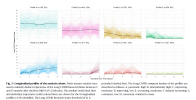Karen Kirke
Senior Member (Voting Rights)
I hope someone will be able to point me to studies that have documented the resolution of (ME/CFS-like) long COVID at regular intervals during the first year and beyond.
A bit like this from the Dubbo study by Hickie et al. 2006 https://pmc.ncbi.nlm.nih.gov/articles/PMC1569956/:
I know I have read some but I haven't retained which studies they are in, so would appreciate help!
A bit like this from the Dubbo study by Hickie et al. 2006 https://pmc.ncbi.nlm.nih.gov/articles/PMC1569956/:
The case rate for provisional post-infective fatigue syndrome was
35% (87/250) at six weeks,
27% (67/250) at three months,
12% (29/250) at six months, and
9% (22/250) at 12 months.
I know I have read some but I haven't retained which studies they are in, so would appreciate help!






